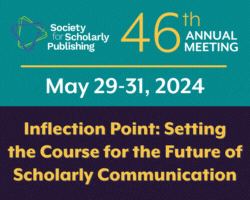The 36th Annual Meeting begins today at the Westin Boston Waterfront Hotel with over 900 people in attendance! Leading off the meeting is keynote speaker Chris Lintott, a University of Oxford astronomer, who will present “Publishing for the Crowd: Thoughts from Citizen Science.”
Lintott is founder and principal investigator for the Zooniverse, a web portal for a series of Internet-based science projects with an intriguing commonality–they invite members of the public to get involved in the research.
In his keynote, Lintott will discuss the rise of “citizen science” and consider what motivates the Zooniverse’s many volunteers to participate and what stops them from pursuing their interest further.
“We thought Chris’s work at Zooniverse was a great example of how science (and scholarly publishing) could benefit from reaching out to the various stakeholders,” Emilie Delquie, cochair of the Annual Meeting Program Committee, said. “This is a topic that aligns nicely with this year’s theme, ‘Who’s at Stake and What’s at Stake? Looking Outward at the Future of Scholarly Publishing.’”
Lintott also cofounded the project that started the Zooniverse, Galaxy Zoo, which looks at how galaxies form. The project started in 2007 when the team of scientists behind it found themselves facing a massive data set: images of approximately 1 million galaxies taken from the Sloan Digital Sky Survey telescope at Apache Point Observatory in New Mexico and released to the scientific community and public.
As an important component of their research, the team needed to categorize the galaxies according to shape: spiral or elliptical and, if a galaxy was spiral, to determine the direction of the arms. It was a formidable task given the size of the data set, so they invited the public to help view and classify the images online via a website dedicated to the project.
The response from volunteers was immediate and incredible. Within 24 hours of the project’s launch, the Galaxy Zoo team was receiving nearly 70,000 classifications an hour. And in the first year, they received more than 50 million classifications from more than 150,000 volunteers, according to the Galaxy Zoo website.
That “ability to cope with extremely large data sets” is one of the advantages of involving the public in academic research, according to the Citizen Science Alliance (CSA), the collaboration of scientists, software developers, and educators who develop and manage the Zooniverse. Among other benefits cited by the CSA are instances of “serendipitous discovery,” which come from exposing data to many users, and the “wisdom of crowds”–for example, the Galaxy Zoo site explains that when it comes to classifying galaxy shapes, “having multiple independent classifications of the same object is important, as it allows us to assess how reliable our results are.”
Today, Galaxy Zoo is in its fourth iteration and is one of a collection of projects in the Zooniverse. Participants can choose to, among other things, classify tropical cyclone data, annotate and tag the diaries of World War I soldiers, characterize bat calls, or analyze cancer data. Each project has its own science team that identifies data sets and tasks and uses the end results.
Thus far, more than 1 millions citizen scientists worldwide participate in Zooniverse projects.
Lintott, in addition to being a researcher in the Department of Physics at the University of Oxford, is a copresenter of the BBC’s The Sky at Night and coauthor (with original Sky at Night presenter Sir Patrick Moore and Queen guitarist/astrophysicist Brian May) of two books—Bang! The Complete History of the Universe and The Cosmic Tourist.
By Katrina Swartz, Communications Committee Member



Join the Conversation
You must be logged in to post a comment.